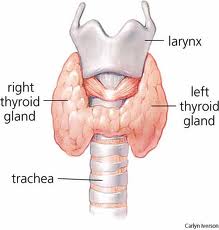|
There are 6 Major Thyroid Patterns
The thyroid gland gets lazy and the pituitary gland tries to “kick it in its pants” by pumping extra TSH. (high TSH) This is the only pattern of the six that may need HRT. (Hashimotos may need it too) II. Hypothyroidism is Secondary to Pituitary Hypofunction The pituitary gets “lazy” (low TSH below 1.8) for many reasons:
The gland is making enough T4 but there is a decrease in conversion from T4 to the active form T3 (low T3). Why? Chronic Adrenal Stress gives rise to increased cortisol which suppresses T4 to T3 conversion. This is due to chronic infection/ inflammation. This condition is often missed because low T3 doesn’t affect TSH only T4 does and T3 is rarely checked for with the blood test. IV. Thyroid Over-Conversion and Decreased TBG Too much active T3 is made and is overwhelming the cells or too little TBG which means too much free T3. Why? The No. 1 cause is insulin resistance especially in women. The cells are not “listening” to insulin so more insulin is secreted. This increases testosterone levels in females resulting in too much free T3 and too little TBG. V. Thyroid Binding Globulin (TBG) Elevation Too much TBG in the blood and thus too little free T3. Why? Oral contraceptives or estrogen replacement therapy causes an increase in estrogen which leads to increases in TBG. VI. Thyroid Resistance Pituitary and Thyroid glands are fine and so are the hormone levels. However the hormones aren’t getting into the cells. Why? Chronic stress response stimulates the adrenal glands to produce too much cortisol which causes cells to be resistant to thyroid hormones. Nutritional support if caught early can reverse these problems- we use proper testing and specialized nutritional compounds to do this! Thyroid Dysfunction is a Sign of Metabolic Dysfunction… Proper Testing is Crucial! SPECIFIC METABOLIC TESTING FOR THYROID DISORDERS These tests are specific to each patient. Some patients may need more or less lab tests than others. Some tests we can do in office rather than sending out for lab tests. I: Food Sensitivity Testing To determine if you have a sensitivity to gluten (wheat, rye, oats, and barley), milk, eggs, yeast, and soy. If you are sensitive to ANY of these food groups, it could be making you’re your thyroid condition worse as it will increase inflammation in your brain and throughout your body! If you suffer from Hashimoto’s thyroiditis, you need to be off of all gluten….NOW! Here are some of the symptoms of these sensitivities:
There are various types of food sensitivity tests, our clinic currently uses the Enterolab test (www.enterolab.com) and Cyrex Labs (www.cyrexlabs.com). II. Complete Blood Panels By using specific blood tests such as: #1: A complete metabolic panel (CMP) #2: A lipid panel #3: A CBC (complete blood chemistry with auto differential) We can assess your adrenal glands, liver, kidneys, red/white blood cells and gut function with the above lab tests. All can be affected with chronic health conditions. By addressing any problems with your adrenal glands, blood chemistry, or gut function, we can help you to heal faster. The CMP also allows us to check your blood glucose levels since glucose and oxygen are needed by the brain to function properly. What other tests of the thyroid are necessary?
III: Adrenal Stress Index (ASI) You can test the adrenal glands with a test called an Adrenal Stress Index. This is a salivary test much like DNA testing. The adrenal glands sit right above the kidneys and they are your “stress” organs meaning that they react to stress. If the patient has been or are currently under stress, this test is a must! IF THE PATIENT SUFFERS FROM INSOMNIA AND/OR DIABETES, THIS TEST IS A MUST! IT WILL MEASURE THEIR CORTISOL LEVELS. IV. Intestinal Permeability This test is used to determine if the patient suffers from leaky gut syndrome (LGS). LGS or Leaky gut syndrome describes a condition of altered or damaged bowel lining, caused by antibiotics, toxins, poor diet, parasites or infection can lead to increased permeability of the gut wall to toxins, microbes, undigested food, waste or larger than normal macromolecules. It has been proposed that these substances affect the body directly, while others postulate an immune reaction to these substances. We currently use Cyrex Labs to perform this testing. (www.cyrexlabs.com) V. HORMONE PANELS We can check hormone panels to determine if the patient suffers from low testosterone in males or low estrogen/progesterone levels in females. Symptoms related to decreased hormone levels may include depression, fatigue, mental fogginess, mood swings, hot flashes, sweating attacks, weight gain, and decreased physical stamina. VI. STOOL MICROBIAL SCREENING Stool testing can check for bacterial, parasite, or yeast infections. Testing through stool can also show us how much good bacteria your gut currently has, without healthy gut flora your immune system can not function at its best. Poor gut function can lead to GI complaints such as constipation or diarrhea, as well as headaches, fatigue, and weight gain. VII. TOXICITY SCREENING We can check for toxins such as heavy metals or other antigens to determine if this is creating your health to breakdown. We test for toxins through hair or urine samples. |
